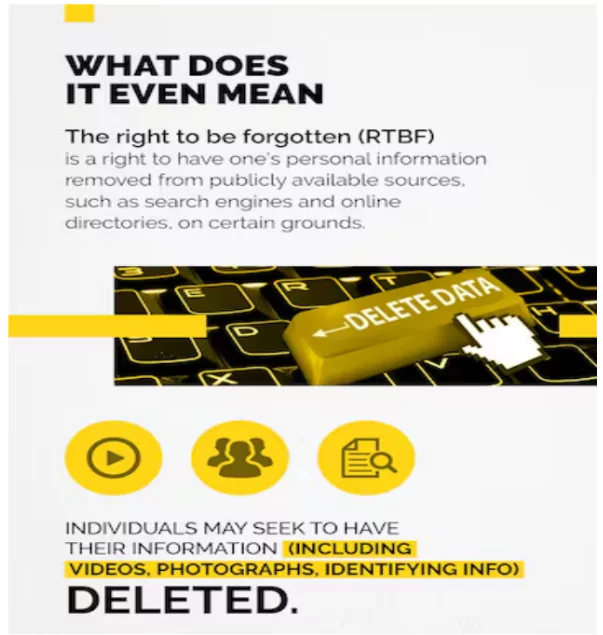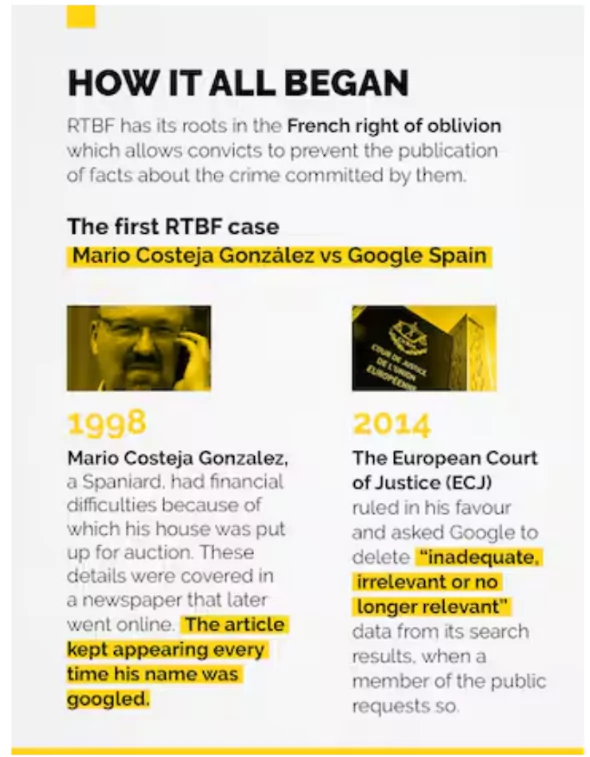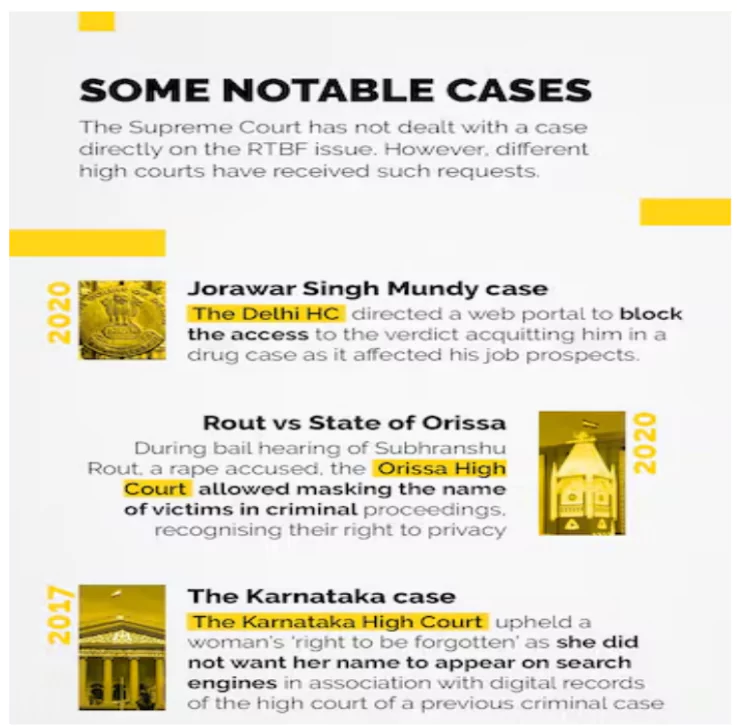A three-judge Bench headed by Chief Justice of India (CJI) will hear a challenge against a Madras High Court ruling that directed legal search portal Indian Kanoon to take down a judgment in a 2014 rape and cheating case.
- The acquitted man had moved the Madras HC in 2021, saying that he had been denied the citizenship of Australia because his name appears in the judgment that is publicly available on the legal portal.

What is the Right to be Forgotten?
- The right to be forgotten can be loosely described as the right to remove one’s digital footprint (from Internet searches, etc.) where it violates the right to privacy.
- Significance: From victims of so-called “revenge porn” to individuals whose personal cases are on the Internet, the right to be forgotten is a crucial remedy.
- Legal Basis: This right is more specific and is prominently recognized under the General Data Protection Regulation (GDPR) in the European Union
Enroll now for UPSC Online Course
How is the right interpreted in India?
- No Statutory Framework: In India, there is no statutory framework that prescribes the right to be forgotten.
- However, not all constitutional rights need to be written in black and white.
‘Right to be forgotten’ within the EU
- Google case : The ‘right to be forgotten’ (RTBF) was first derived from the Google case wherein the European Union Court of Justice held that search engine providers, such as Google, have a responsibility for checking the personal information that appears on web pages that are published by third parties.
- In “Google Spain case”: The court ruled on the plea of Spanish lawyer Mario Costeja González to have Google remove information from 1998 regarding the forced sale of his property due to social security debt.

|
- Justice K S Puttaswamy v Union of India (2017): Apex court explicitly recognised the right to privacy as a fundamental right, placing it as a facet of the right to life, right to equality, and the right to freedom of speech and expression.
- Justice S.K. Kaul Said: Right of an individual to exercise control over his personal data and to be able to control his/her own life would also encompass his right to control his existence on the Internet
How have courts ruled on the issue?
In several isolated pleas, mostly asking the court’s permission to take down information in court rulings, courts have passed orders with regard to this right.
- Rajagopal vs. State of Tamil Nadu 1994: SC had talked about a “right to be let alone”.
- Judgment: A citizen has a right to safeguard the privacy of his own, his family, marriage, procreation, motherhood, child-bearing and education among other matters. None can publish anything concerning the above matters without his consent whether truthful or otherwise
- Distinction: But the ruling drew a distinction between the right to be let alone and the publication of public records, such as court decisions.
- Exception: This is for the reason that once a matter becomes a matter of public record, the right to privacy no longer subsists and it becomes a legitimate subject for comment by press and media among others
- In Dharamraj Bhanushankar Dave vs State Of Gujarat (2017): Petitioner had asked the Gujarat HC to remove details of his acquittal in a murder and kidnapping case, saying that it had come up during background checks while he was applying for an Australian visa.
- The court refused to grant him relief, holding that court orders are allowed to be in public domain.
- [Name Redacted] vs The Registrar General, the Karnataka HC in 2017: It ensured that the name of the petitioner would be protected in an annulment case.
- Not explicitly mentioned RTBF: Although the court did not substantially engage with jurisprudence on the right to be forgotten, it said that the ruling is in keeping with the trend in the Western countries where they follow this as a matter of rule in sensitive cases involving women in general.

Relationship and Conflicts between Right to be Forgotten & Right to Privacy:
- Intersection:
- Both rights aim to protect personal privacy and data integrity. The Right to be Forgotten is considered an extension of the Right to Privacy in the digital age, addressing the challenges posed by the internet’s permanent memory.
- Conflicts:
- Conflicts can arise between the Right to be Forgotten and the right to freedom of expression and information. For instance, removing information about an individual’s past actions from public view might be seen as censorship or rewriting history.
- Courts and regulatory bodies often balance these rights, considering factors like public interest, the relevance of the information, the individual’s role in public life, and the nature of the data.
Check Out UPSC CSE Books From PW Store
An Ongoing Debate
- For Those In Favour Of RTBF Argue:
- It is necessary due to issues such as revenge porn uploads
- Petty Crimes: To ensure references to petty crimes individuals may have committed in the past don’t haunt them
- Reputation Dilution: Potentially undue influence that such results exert upon a person’s reputation, if not removed
- For Those In Against The RTBF Argue:
-
- Impractical: Questions about the practicality in attempting to implement such a right
- Right to freedom of expression: Concerns about its impact on the right to freedom of expression
- Censorship: Concerns that it would decrease the quality of the Internet through censorship and the rewriting of history
Conclusion
The debate over the RTBF highlights the tension between individual privacy and the collective right to information. While the RTBF provides essential protections for personal dignity and reputation, it must be carefully regulated to avoid unintended consequences that could impact freedom of expression and the integrity of the internet.
![]() 3 Aug 2024
3 Aug 2024

